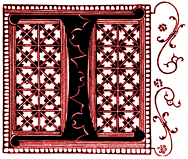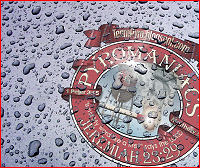 n May, I started a series of posts on 2 Corinthians 5:21. The rigors of my real-life schedule have made it difficult to keep a sense of momentum in that series, but I am determined to finish it.
n May, I started a series of posts on 2 Corinthians 5:21. The rigors of my real-life schedule have made it difficult to keep a sense of momentum in that series, but I am determined to finish it.For those wishing to keep up, here's a list of all the previous posts in the series:
- The Key to the Gospel
- The heart of the gospel?
- The Justice of Calvary
- Back again
- About that series of posts I keep promising . . .
- The Great Exchange (Part 1)
- The Great Exchange (Part 2)
- Back to bidniss
 We're taking note of three perspectives of Christ presented in 2 Corinthians 5:21. In the previous post of this series, we examined the first of the three, "Christ as sinless."
We're taking note of three perspectives of Christ presented in 2 Corinthians 5:21. In the previous post of this series, we examined the first of the three, "Christ as sinless."Now we turn to what may be the most difficult expression in our text and consider—
Christ Made Sin
"Christ made sin"?
I wouldn't use such language if Scripture didn't use it: "He [God] hath made him [Christ] to be sin for us." That is a deliberately shocking expression. I hope it jars your mind and offends your sensibilities.
God made Christ to be sin. That's not an easy statement to process, but it is pregnant with meaning. Let's see if we can begin to get a grasp on what it means.
But first...
Let's talk about what it doesn't mean. It doesn't mean that God made Christ to be a sinner. And that's clear by the phrase immediately following, which we have already dealt with. Christ "knew no sin." In other words, he knew no sin by His own experience. He had no personal guilt. He was without any blame or sinful corruption whatsoever.
And Paul isn't suggesting that the character of Christ was changed at the cross. Now and then, you'll hear some careless or misguided individual claim that Christ "became a sinner" on the cross, or that he took on Himself corruption and guilt in such a way that He ceased being righteous and was, in effect, a transgressor like us.
That is not what this means.
I've already quoted Hebrews 7:26, which says that Christ was "holy, harmless, undefiled, separate from sinners, and made higher than the heavens." The cross changed nothing of His innocent character. He was not made into a wicked person, nor was He in any way tainted by sin. He died as "a lamb without blemish and without spot." And this expression doesn't mean anything that would change that truth. Those who teach that Christ became "sinful" on the cross have misunderstood how our sins were imputed to Him.
There are others who want to go the opposite direction, and tone down the expression Paul is using. They point out that in the Hebrew language, the same word is used for "sin" and "sin offering." So, they say, maybe Paul was employing a Hebraism. Perhaps the verse ought to be translated this way: "He hath made him to be [a sin offering] for us, who knew no sin; that we might be made the righteousness of God in him."
Now, that might seem to make sense and do away with the offensiveness of the expression. And the statement itself would be true enough: Christ became a sin offering.
But that's not what Paul means here, and you can't sustain that interpretation linguistically, grammatically, or contextually.
|
So the translation is correct as it stands. "he hath made him to be sin for us." It doesn't mean Christ literally became guilty; and it doesn't mean merely that He became a sin offering.
OK. So what does it mean?
It can mean only one thing: He was made sin by imputation. He was made sin for us, on our behalf, on account of our sin. He became, in a figurative sense and in a judicial sense, the embodiment and the symbol of our wickedness.
The meaning of the expression is explained by the prophecy of Isaiah 53:6: "All we like sheep have gone astray; we have turned every one to his own way; and the LORD hath laid on him the iniquity of us all."
Our sin, with all its guilt and shame, was imputed to Him, put to His account, reckoned as if it were His—even though it was not. Or, to back up a few verses, in the words of Isaiah 53:4: "He hath borne our griefs, and carried our sorrows."
What griefs and what sorrows? The punishment for our guilt. Verse 5 makes it explicit: "He was wounded for our transgressions, he was bruised for our iniquities: the chastisement of our peace was upon him."
That's clear, isn't it? He took the burden and the guilt of our sin on Himself without actually becoming sinful. Our sin was imputed to Him, or reckoned to His account, and He paid for it.
And furthermore...
There's actually a parallel expression in Galatians 3:13: "Christ hath redeemed us from the curse of the law, being made a curse for us."
He was made sin for us. He was made a curse for us.
Again, the language is deliberately powerful. To say He was "made sin" is in some ways even more shocking than saying He was "made a sinner." It means that God treated Him as if He were the very embodiment of everything vile, and contemptible, and base, and evil—and He did that "for us."
|
This verse is impossible to explain adequately without understanding the concept of imputation that lies at the heart of Paul's teaching on justification. Because Scripture repeatedly stresses the utter sinlessness of Christ—including right here in the very verse we are considering. Only if Christ was "made sin" by imputation can the full sense of this text make good sense.
And as we're about to see, Paul is actually describing a double imputation in this verse. In other words, the imputation goes both ways: the believer's guilt imputed to Christ, and Christ's righteousness reckoned to the believer. Paul deliberately makes precisely that parallel, and though some have already quibbled about calling this an "exchange," that is exactly what Paul is saying.
 We'll flesh those ideas out a little more in the final posts in this series.
We'll flesh those ideas out a little more in the final posts in this series.I'm going to try my best to finish before too much more time elapses or the series gets so old no one cares any more. In fact, my goal is to finish the series next week. Please bear with me.

PS: Here's some good news via Justin Taylor's blog. I can't wait to see Piper's reply to NT Wright on justification. Can someone at DGM wrangle me a copy of the manuscript?











9 comments:
Brother Phil:
Excellent! Such a wonderful exchange; glory to Jesus!
I can't help but smile, even weep at such wonder. Thank you for bringing the meaning out so well!
Grateful for the cross,
David Hewitt
Phil, I appreciate the little list of links at the beginning of this post. Please do that when you write the final post on this series; I wish to give that a permanent link on Fide-O. This series of post, IMO, address the most important topic that I believe could be discussed today... blogosphere included. Thanks for taking the time.
Thanks Phil. About the only comment I can add to this is Oh, the depth of the riches and wisdom and knowledge of God! How unsearchable are his judgments and how inscrutable his ways! (Romans 11:33 ESV)
Phil:
Regarding the imputation of righteousness, we know Christ's righteousness remains His righteousness and is only credited to us. We have no righteousness of our own either before or after salvation.
In the same way, can we say that our sins are credited to Him but remain ours? Not in the sense that we will have to pay for them - He has done that - but in that we are the source or origin of those sins that were imputed to Him. He had no sin before the Sacrifice and He has none afterwards.
Imputation does not mean possession, as you know: it means we are declared righteous and not made righteous. So can we say that Christ was declared sin (forensically) but not made sin (actually)? Is this intrinsic or inherent in theological imputation?
Just wondering out loud . . .
Mike: "So can we say that Christ was declared sin (forensically) but not made sin (actually)? Is this intrinsic or inherent in theological imputation?"
Of course. But I don't think there's any reason to make a separate category of "theological imputation." Forensic reckoning was part of everyday life in Paul's time, just as it is today.
Paul is actually describing a double imputation in this verse.
Amen. That's the gospel truth.
Wonderful teaching! Thank you for interpreting this verse with such care.
It's so very clear when placed within the whole counsel of God's Word. And yet this one verse has spiritual depth that is unfathomable.
Paul also says he prays that we would know the love of Christ, which is beyond knowing.
To the Lord be all glory. Amen.
Another excellent post, Phil. Thanks!
You said, "The cross changed nothing of His innocent character. He was not made into a wicked person, nor was He in any way tainted by sin." This is important to point out. Men like Kenneth Copeland have espoused the belief that Christ did indeed become sinful (I think he even referred to Jesus on the cross as a "demonic being"). What they don't seem to understand is that if Christ had indeed become sinful, then his sacrifice would have been meaningless. A sinful savior is no savior at all. Only the spotless Lamb of God could have atoned for our sin.
Keep up the good work!
Hope this is not a repeat comment:
I just want to thank you for this incredible explanation of this verse. It did bring tears to my eyes!
Post a Comment